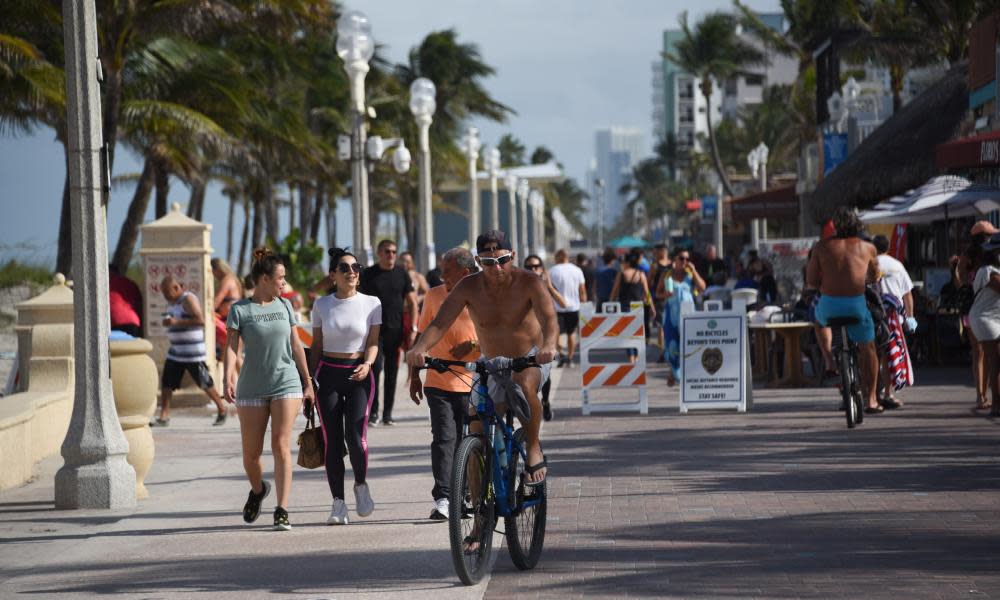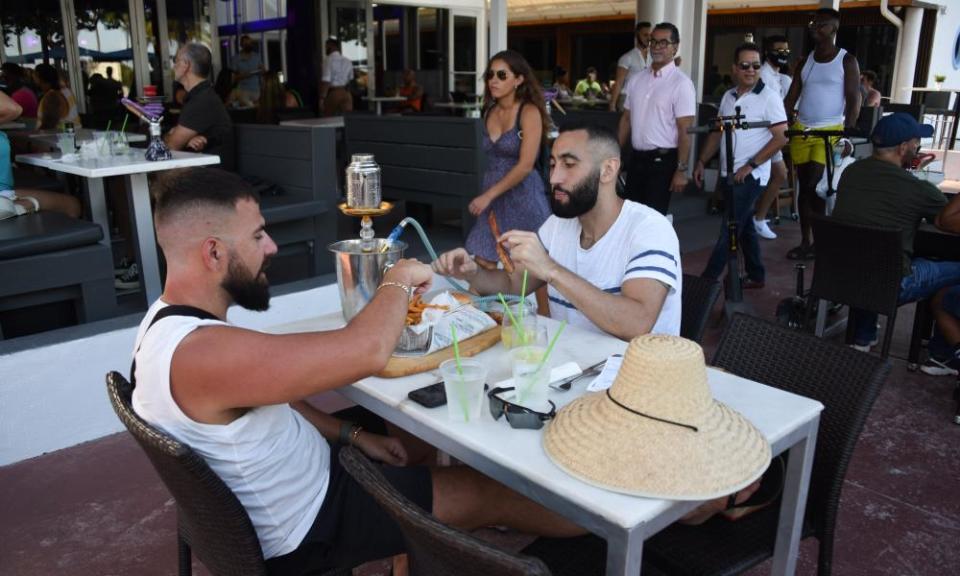Florida’s Covid-19 surge shows the state's reopening plan is not working

It has been seven weeks since Florida’s governor, Ron DeSantis, took a coronavirus “victory lap”, pressing ahead with a swift reopening program while berating the media for a “doom and gloom” approach he said bore little relation to reality.
“We haven’t seen an explosion of new cases,” DeSantis insisted during a 29 April news conference, a day on which the state’s Covid-19 tally increased by 347.
“There is a light at the end of the tunnel,” DeSantis, a keen Trump ally, added.
Related: Scientist produces own Florida Covid-19 count after being fired by state
This week, however, it became clear that the Republican governor’s garden of roses is wilting fast in the face of a resurgent virus.
A period that began with Florida’s daily record of new cases below 1,700 saw eight consecutive days above that figure, five of them topping 2,000 and both Thursday and Friday seeing the highest numbers of all: 3,207 and 3,822 cases, respectively, eclipsing the previous recorded high by more than 35%.
The staggering figures have caused experts at the Children’s Hospital of Philadelphia and University of Pennsylvania to conclude that Florida has “all the markings of the next large epicenter of coronavirus transmission”. Such a consequence could be significant in a politically sensitive swing state that analysts agree Donald Trump must win in November to secure a second term as president.
“Governor DeSantis has lost control of Florida’s Covid-19 response,” said Nikki Fried, the agricultural commissioner and only Democrat elected to statewide office, who has previously complained at being shut out of DeSantis’s recovery taskforce.
“His policies are simply not working and he’s recklessly reopening Florida despite the data screaming for caution. Refusing to acknowledge the alarming patterns in cases, hospitalizations and positivity is not only arrogant but will cost lives, public health and our economy,” Fried added.
The rise in Florida’s figures, with close to 90,000 cases and deaths surpassing 3,000, comes as the majority of its 67 counties reach the end of the second week of DeSantis’s “safe, smart, step-by-step” reopening plan.

Beaches, bars and restaurants, movie theaters and entertainment venues are mostly open again, with tighter restrictions in the hardest-hit counties of Miami-Dade, Broward and Palm Beach. Universal Orlando resort welcomed back guests on 5 June and Disney World will reopen its theme parks next month.
DeSantis, meanwhile, contends that Florida is on the right track, arguing that the rising figures can be attributed to increased testing, particularly among younger residents, and concentrated pockets of outbreaks among agricultural workers, prison inmates and even a 52% positivity rate among airport workers – an unsubstantiated claim debunked by the Orlando Sentinel.
He refuses to consider calls to slow or reverse the pace of Florida’s reopening. “We’re not shutting down. We’re going to go forward. We’re not rolling back. You have to have society function,” DeSantis said on Tuesday.
His comments came the same day Vice-President Mike Pence wrote in a Wall Street Journal opinion piece that concerns over a second wave of coronavirus were “overblown” by the press, and that the White House was “winning the fight against the invisible enemy”.
DeSantis’s critics say that although testing has increased in Florida, the number of cases has risen at a significantly higher rate. They point to other indicators, such as declining availability of intensive care and other hospital beds around the state, and a rising positivity rate in Covid-19 tests that has climbed back above 10% for the first time since April.
Public health analysts see merit in both arguments, but warn of darker days ahead if social distancing is not maintained. Already in Jacksonville some newly reopened bars have closed again after a Covid-19 outbreak.
“The bulk of this is almost certainly due to testing [but] there is definitely evidence of wider community spread, typically among younger folks,” said Dr Charles Lockwood, senior vice-president of USF Health in Tampa and dean of the university’s Morsani college of medicine.
“There are enough signals, a drop in test negativity, a slight increase in influenza-like illnesses, bad behavior in terms of social distancing, that I’m concerned.”
Around the state there are rumblings that renewed closures could become necessary. Jerry Demings, the mayor of Orange county, said he would consider a lockdown if numbers continued to rise, a view echoed by Francis Suarez, the mayor of Miami.
Municipalities are also tightening up restrictions because of the surge. Beginning Friday, businesses in St Petersburg must ensure employees wear masks, now a requirement for visitors to the Florida Keys under a law enacted this week.
Carol Dover, president and chief executive of the Florida restaurant and lodging association, said she remained “guarded” about the immediate future of the state’s $67bn tourism industry, even though numbers since the reopening “are still going in the right direction”.
“Our members are doing everything they can to survive at 50% [occupancy], hoping the governor will be able to get us to 75 or 100%,” she said. “I’m hopeful and somewhat guarded because we’re not completely open yet but I feel the governor has done an amazing job.”
